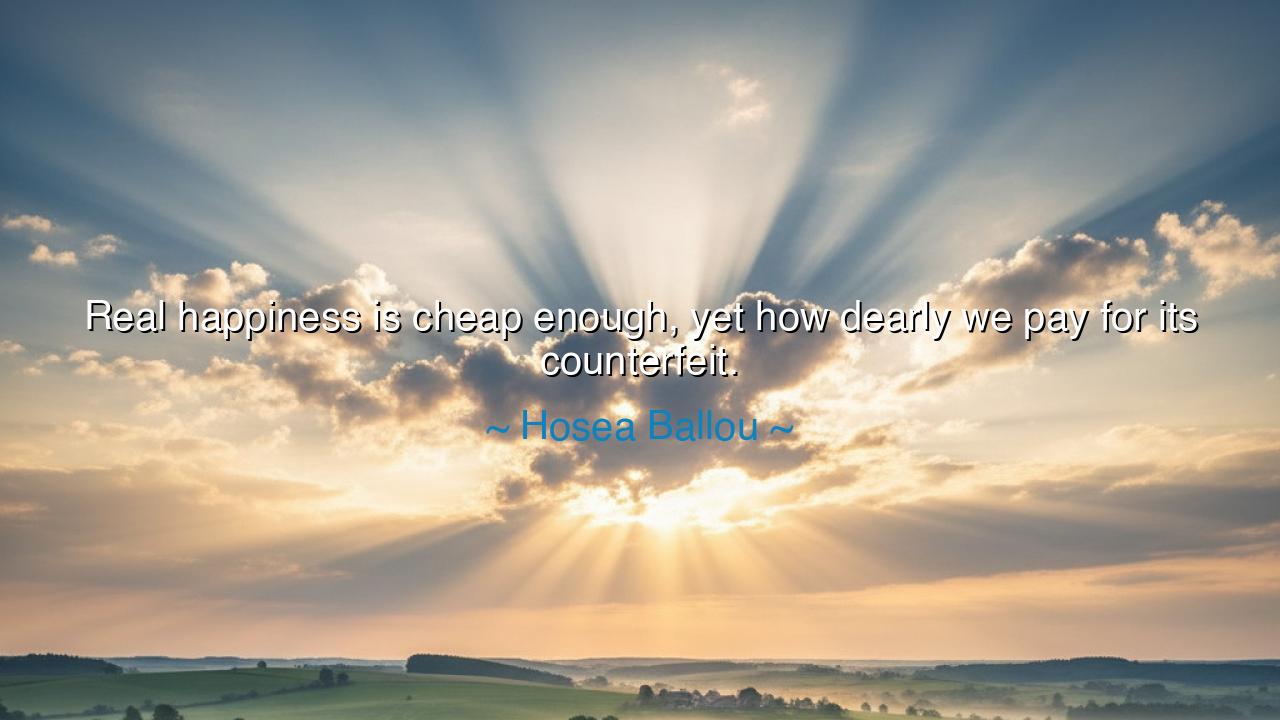
Real happiness is cheap enough, yet how dearly we pay for its






The great American theologian Hosea Ballou, a preacher of wisdom and simplicity, once declared: “Real happiness is cheap enough, yet how dearly we pay for its counterfeit.” In these few words, he unveils a truth as timeless as the human heart itself—that the essence of true happiness lies not in the wealth or grandeur we chase, but in the quiet treasures already within our reach. Yet mankind, blind in its longing, often forsakes the simple and the genuine for glittering illusions that promise joy but deliver emptiness. Ballou’s words are a mirror to the soul, reflecting both our yearning and our folly.
To understand this saying, one must look to the age in which Hosea Ballou lived—the early nineteenth century, when the winds of material progress swept through a young America. The world was changing rapidly; ambition, commerce, and invention promised a new kind of happiness born from success and possession. Yet Ballou, a humble Universalist minister, saw through the illusion. He knew that as wealth increased, so too did restlessness. He perceived that real happiness, like truth, costs nothing—it is found in virtue, in love, in peace of mind, in the warmth of friendship and the calm of conscience. But the counterfeit—the false happiness sold by vanity, greed, and indulgence—extracts a heavy toll, leaving the heart poorer though the purse may be full.
Real happiness is “cheap enough” because it springs from what is eternal and freely given. The laughter of a child, the sunrise over a quiet field, the comfort of honest work, the affection of one’s family—these are gifts that require no purchase, no power, no applause. They belong to all who choose to see them. But the counterfeit, the happiness bought through luxury, status, or fleeting pleasure, demands ceaseless payment. It costs one’s time, one’s peace, and often one’s soul. It is the banquet that leaves the guest hungrier still, the golden crown that grows heavy with regret.
History offers us countless examples of this truth. Consider the tragic figure of Howard Hughes, one of the richest men the modern world has ever known. Surrounded by wealth beyond measure, he sought happiness through fame, indulgence, and control. Yet in the end, he lived in isolation, consumed by fear and dissatisfaction. His riches, the counterfeit promises of joy, became his chains. Contrast this with Mother Teresa, who owned almost nothing yet lived in profound contentment, her joy flowing from service and love. Her happiness was real, and thus it cost her nothing; in giving herself to others, she gained everything.
Ballou’s wisdom also speaks to the human tendency to confuse pleasure with peace. Pleasure fades with time, demanding greater and greater indulgence to sustain itself. Peace, however, deepens the more it is shared. The ancient philosophers knew this well. The Stoics taught that happiness lies in virtue, not in possession; the Buddhists taught that suffering arises from attachment, not from lack. Ballou’s teaching stands among these eternal truths: that the richest man is he who desires little, and the poorest is he who can never be satisfied.
To live by this teaching is to learn the art of discernment—to look beyond appearances and ask whether what we pursue nourishes the soul or merely feeds the ego. It is to choose contentment over craving, simplicity over show. The wise cultivate gratitude, for gratitude reveals that happiness was never missing—it was merely overlooked. When one learns to find joy in the humble and the true, the world itself becomes radiant. The false glitter of counterfeit happiness fades, and what remains is the quiet, steady light of a life well-lived.
So, my children, remember this: real happiness does not demand sacrifice of the spirit. It is found in honesty, in love, in gratitude for the present moment. Guard your hearts against the counterfeits that the world sells—fame, vanity, endless desire—for these things cost too much and give too little. Seek instead the happiness that endures: the peace of a clear conscience, the joy of giving, the beauty of simplicity.
And thus, take Hosea Ballou’s wisdom as a guiding flame: “Real happiness is cheap enough, yet how dearly we pay for its counterfeit.” Let it remind you that the truest treasures of life cannot be bought or stolen—they are earned by kindness, gratitude, and purpose. Learn to love what is small yet sincere, and you will possess what kings and conquerors never could: the wealth of a contented heart. For the one who knows what is real will never again waste their soul upon the false.






AAdministratorAdministrator
Welcome, honored guests. Please leave a comment, we will respond soon